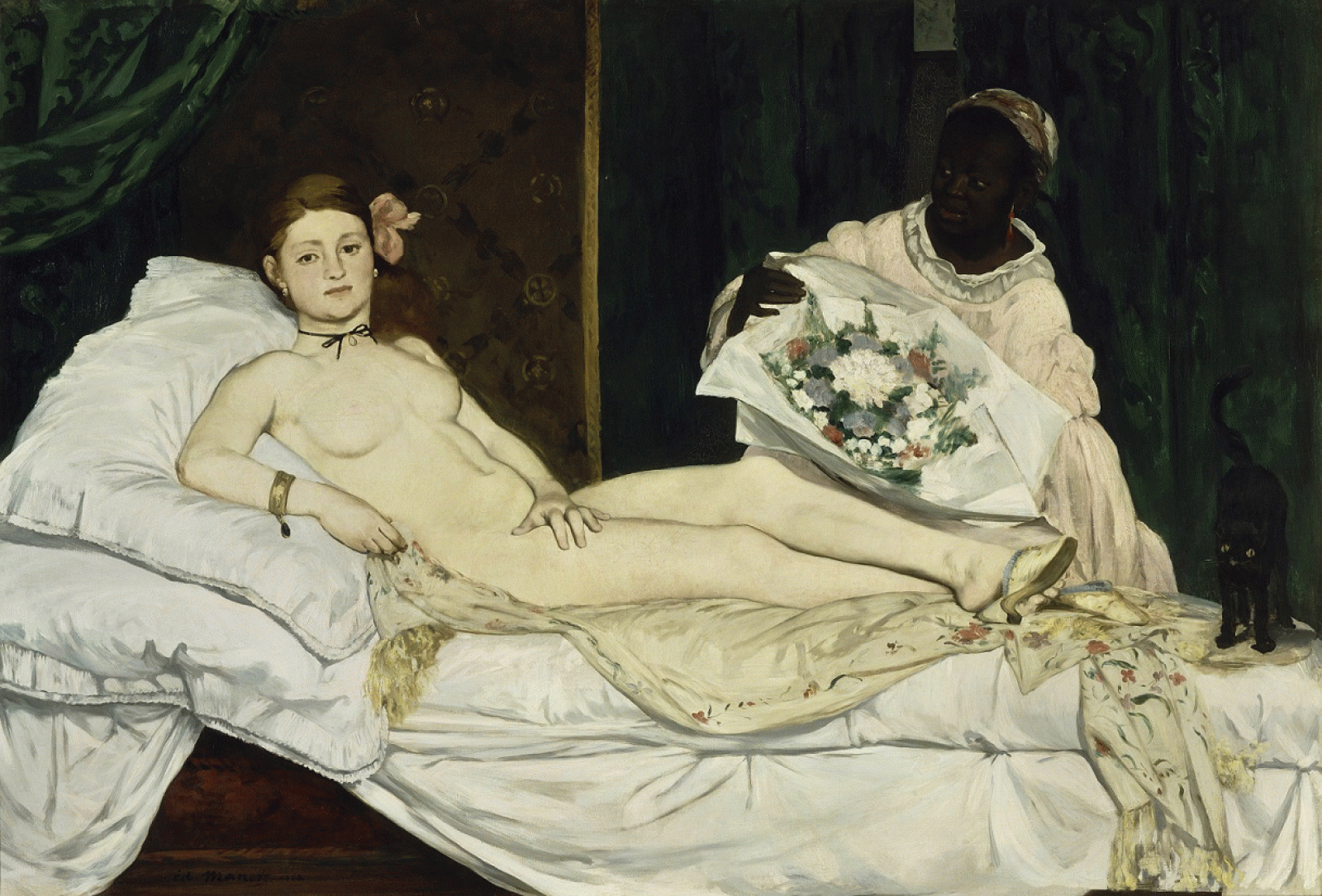Conferenza
Monika Wagner: ‚Reine‘ und ‚unreine‘, kalte und warme Farben als soziale und ethische Indikatoren

Édouard Manet: Olympia, Öl/Lwd., 1863, Paris Musée d'Orsay (wikimedia commons, gemeinfrei)
Über verbale Charakterisierungen von Farben, bzw. Farbeindrücken lassen sich Wertungen formulieren, die zwar ambivalent und kontextabhängig sein mögen, aber gleichwohl ästhetisch Plausibilität beanspruchen. Zum einen argumentierte die abstrakte Kunst des frühen 20. Jahrhunderts mit derartigen Zuschreibungen. Zum anderen können die Farbzuschreibungen sich den Darstellungsgegenständen anlagern. Körperbilder erweisen sich dafür als besonders empfänglich. Vor allem für das Inkarnat spielen Konzepte von ‚reinen‘ gegenüber ‚schmutzigen‘, von kühlen gegenüber warmen Farben, wie sie etwa in den Farbordnungen seit der Zeit um 1800 entwickelt wurden, eine zentrale Rolle. Wie auf diese Weise seitens der Kunstkritik und der Kunstgeschichtsschreibung soziale und genderspezifische Normen in die ästhetische Debatte eingetragen wurden, soll an Exempeln aus Skulptur und Malerei der zweiten Hälfte des 19. und des frühen 20. Jahrhunderts untersucht werden.
The lecture will take place online via Zoom. The registration is free, but mandatory. Please register at the following address:
https://zoom.us/meeting/register/tJIpcemhrzwjGtATEOQlTZyw49jzSs9oVv7d
This talk is part of the Lecture Series "Phenomenon ‘Colour’. Aesthetics – Epistemology – Politics" (organised by Hana Gründler, Franziska Lampe/ZI Munich and Katharine Stahlbuhk/BH Rome)
The preoccupation with colour, which in many cultures plays a fundamental role in artistic practice, art history, and art theory, is driven and at the same time complicated by the fact that colour as an optically mediated sensory impression is always determined by subjective factors, such as the respective condition of the perceptual apparatus. However, colour (and its perception) is also dependent on a variety of external physical conditions and is decisively shaped by social and cultural preconditions, as well as linguistic meanings and attributions. Seeing and talking about colour – one of the fundamental tasks of art historians – therefore proves to be a complex process that does not only touch on perceptivity, but is also closely connected to aesthetic, epistemic, ethical and (power-)political questions and problems, and is not least accompanied by (pre-)judgements. This ambiguity – even indeterminacy – of the phenomenon ‘colour’ is a good starting point to grapple with its sometimes divergent characterisations and to question historically rooted attributions and contentious categorisations.
The aim of the lecture series “Phenomenon ‘Colour’. Aesthetics – Epistemology – Politics” is thus to take a critical look at the hierarchies and ideologies associated with colour and to examine what consequences result from the colour schemes, theories and harmonies often determined in the West. The spectrum of questions is broad and may touch upon the following thematic areas: How do we in art history deal with the linguistic limits of describing the phenomenon of colour? How can we talk about colours today, aware of their historical and cultural imprints? How and when do the semantics associated with individual colours change over time? To what extent are colour metaphors and symbolisms instrumentalised nowadays? And as a result: what ethical implications are attributed to certain colours? How and in what form is colour or the lack of it ideologically used and abused? And what are the (power-political) dispositifs in which judgements about colours are made? Or, more fundamentally, why does colour affect us so profoundly?
The lecture series is an additional platform for a critical exchange on the “Phenomenon ‘Colour’”, which will be the subject of a special edition of the journal “kritische berichte” published in spring 2022.
14 ottobre 2021, ore 17:00
This event will take place online. The registration is free, but mandatory.
To participate please register in advance via Zoom: https://zoom.us/meeting/register/tJIpcemhrzwjGtATEOQlTZyw49jzSs9oVv7d
Avviso
Questo evento viene documentato fotograficamente e/o attraverso riprese video. Qualora non dovesse essere d’accordo con l’utilizzo di immagini in cui potrebbe essere riconoscibile, da parte del Kunsthistorisches Institut in Florenz a scopo di documentazione degli eventi e di pubbliche relazioni (p.e. social media) la preghiamo gentilmente di comunicarcelo.


